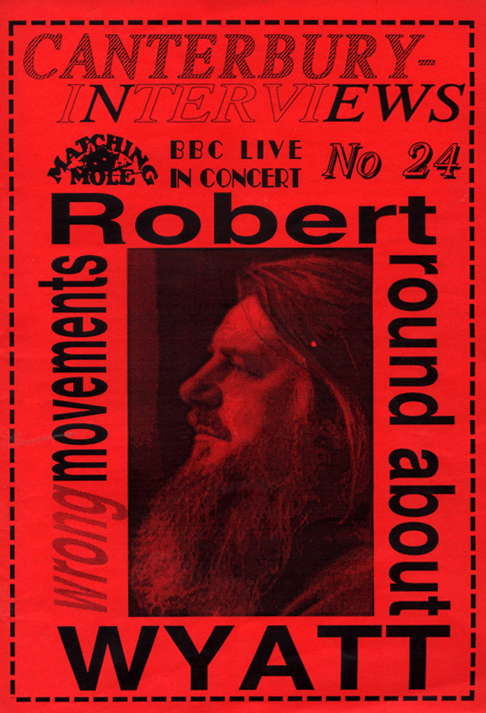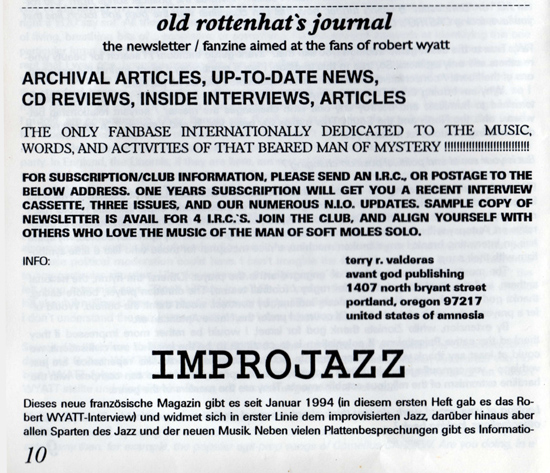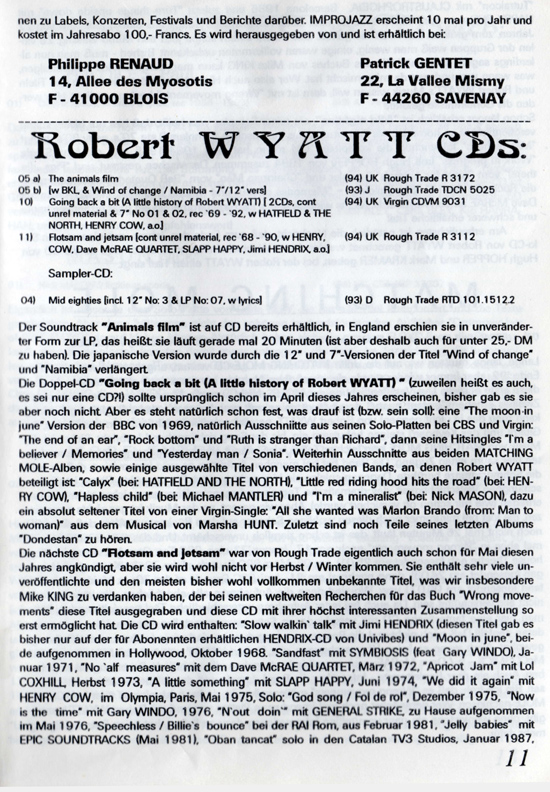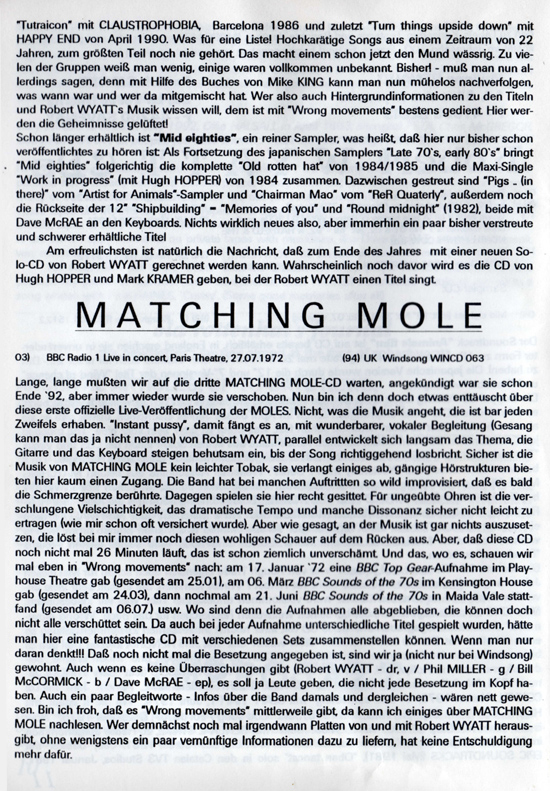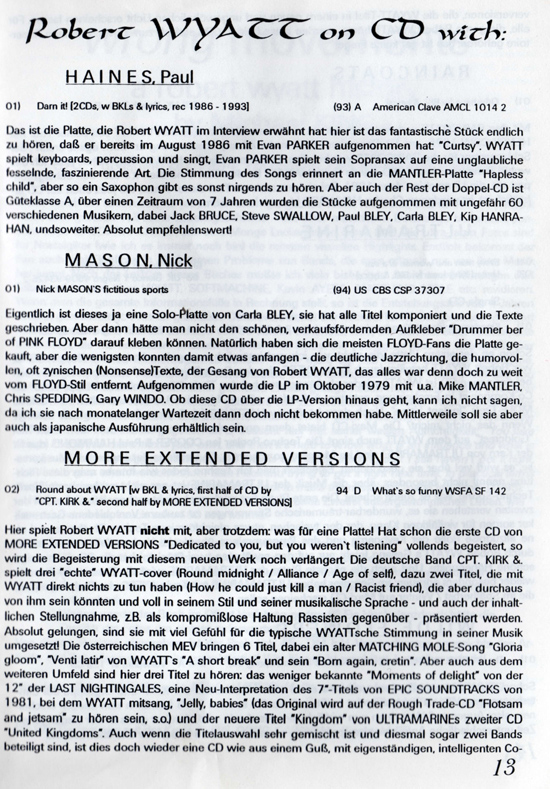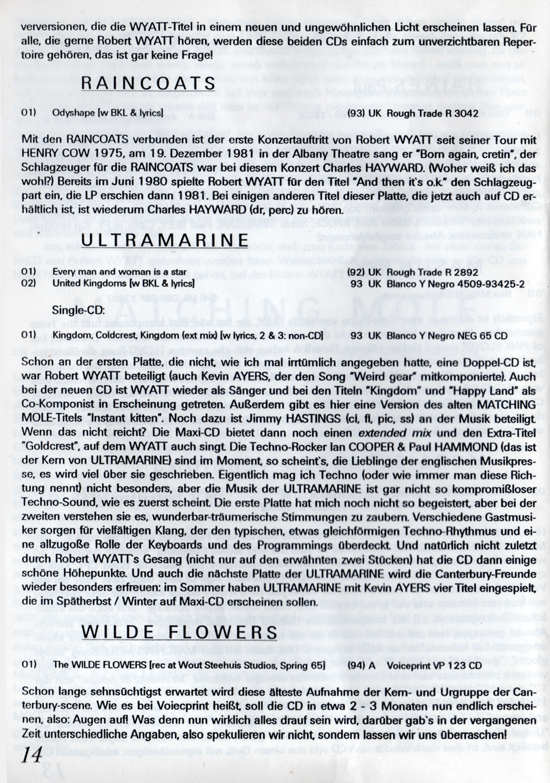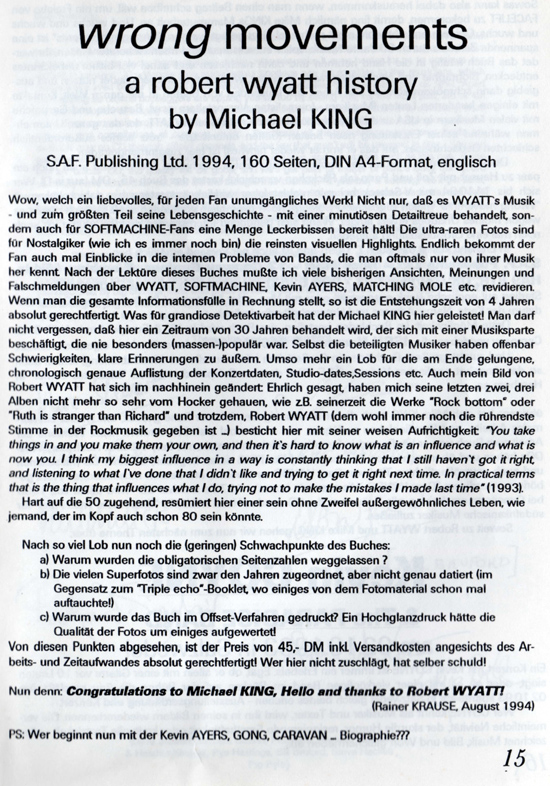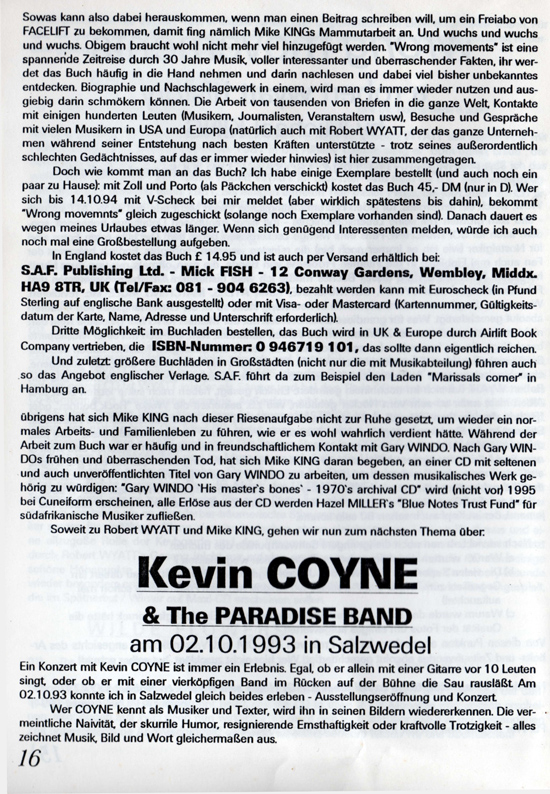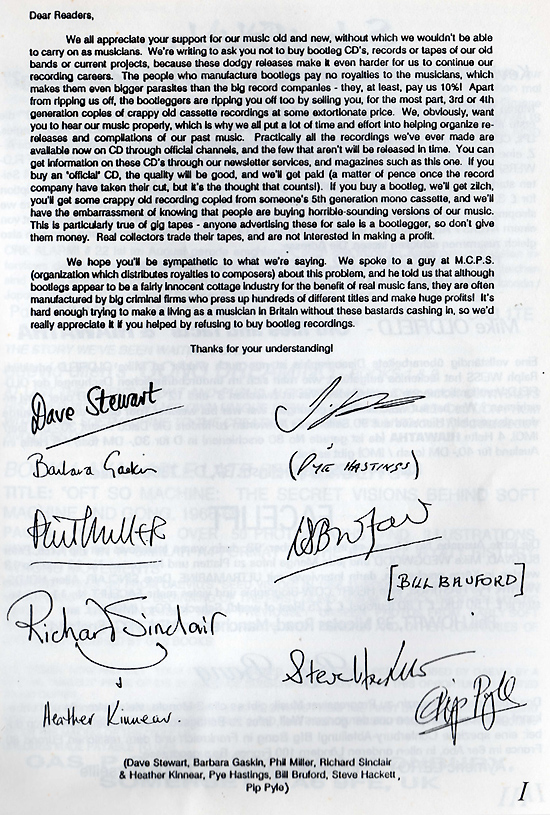|
Terry R. VALDERAS:
If you have any message, or any greetings to our readers, please feel free to make it!
Robert WYATT: I thought I might say something that would lift peoples' spirits in these
neo-depression times. And so ... I'm gonna talk about a problem that smokers have ... which is, you always think, "Oh, I can throw a cigarette butt down the toilet I mean it will flush!" And they don't, they bounce back ... bob ... bob ... bouncing back. You think "Oh, God!" (mock surprise). They tell you you're not to put cigarette butts down there, and you think, "it's gotta go down there!" It's gravity. Well, I've got wonderful news; the thingis: don't panic, don't think, "(mock anger) Oh God, no, now I've gotta fish it out! How can I do that?! What kind of implement ... do they make an implement for fishing cigarettes out?" I don't know of one that you could subsequently use for anything else. Who needs more equipment!! I'm here to tell you, just don't panic! Leave it there!! One day you'll look and it'll be gone. Now, don't ask me where. The people without any soul ... the prosaic, ground-bound people will tell you it's gotten water-logged and flushed. But who's to know? Nobody ever really sees it happen. I think there's a big political implication as well, but I won't get into that yet ... let's get onto the light stuff now, because I don't wanna be heavy the whole time with this stuff!! The spiritualism of butts and so on!! And so I just want to say: Hello!
Tell us about "Nan true's hole" and MATCHING MOLE ?
RW: Well … there's a song called "Nan true's hole", that's got nothing to do with Nan True's Hole. That's how it is with songs … with these sort of subtle song writers. It is the name of a house, that a friend of mine owns, in Sussex. And the origin of the name, I imagine, is that it was the home or ho¬vel of a woman with special powers, perhaps, who lived on her own, called Nan True, who was perhaps a fortune-teller … a witch of sorts who lived in this house. I imagine her regarded with fear, and awe in the supersticious-peasanty british village, in which she lived. My friend had inherited this house, and I just thought, “This name is too good to wasten a house". Phil MILLER agreed, the guitarist (in MOLE) and it turned into a piece of music.
Well … I know I've said that I can't talk about … BA : before the accident. Well, sometimes I can; sometimes I can't! At the moment I feel a kind of wave of affection for ourselves as we were, even for myself so long ago, because it seems like someone else. I listen to those tapes now, and I think "Go! Go! Go!" (laughs very hard). I don't know where, just go somewhere … ya' know!!
We had Phil MILLER on guitar, who would rather play a wrong note than a note that somebody else had ever played. I admired his spirit … and he continues to work and compose in very … rarified forms and atmospheres of … advanced musical knowledge, beyond my technical understanding. I'm glad he was with us when he was in his … you know, younger … early enthusiasm days!
Bill MacCORMICK now works for the Liberal Party, I think. He was the bass player in our band … a very inventive, bouncy bass player. And what a nice man! He was then, and is now.
The two Daves … Dave SINCLAIR used to play Hammond (organ), and people still try and persuade him to play it with CARAVAN. He doesn't understand that; he now owns a keyboard shop, and doesn't understand why people want him to go back to the Hammond! But, those of us who were brought up upon Jimmy SMITH and BOOKER T., we just can't get enough of that Hammond sound. I like it when he bothers to carry it around; it's a big heavy thing, as anyone who plays one or bothers to carry around would know.
Dave McRAE is perhaps the best musician I've ever worked with. A keyboard player at that time, playing mostly electric piano, he's now gone back to, what I think is japanese piano, wich is to say the acoustic type that classical music is played on. He's gone back to the antipides, which has something to do with feet on the opposite side of the earth … Australia. And I miss him! Not just from during the MATCHING MOLE, but during the periods afterwards, when I was experimenting after the second MOLE LP had been recorded, with Dave McRAE, in very informal settings … with Gary WINDO on Tenor (saxophone), and sometimes with Ron MATHESON on bass. I think I reached a kind of organic confidence on drums with Dave, that I'd been reaching for, for a long time. And so that's MATCHING MOLE!
At the moment, were trying to … (laughs) play at a real fun time, as you say in America, because I know that fun is in a curious process of becoming an adjective … trying to get some control over what happens to the tapes; how they are put out, who they’re put out by, and who gets the money. The people, companies like C.B.S. (Records), regard us with total amazement and amusement … that a musician should think they had anything what-so-ever to do with the music that they recordind! And we all know, it really belongs to the beaurocrats at C.B.S., or whomever I say, that, but there are some nice people in there, stuck in the middle of that beaurocracy, saying “We’re doing what we can to help". Let's see if they do … But the difficulty therein, as with most music from that period and before, is that it seems there are people who've decided they have sovereignity over the music of that period. The trouble is that having people claim sole-rights over this music, when it something that feels so much like your own, is a kind of shock. It's a kind of … kind of like rape or something. So at the moment, we feel something like rape-victims (laughs very hard)!!!
There's nothing particularly romantic coming up (now) about MOLE except that the interest of other people, the continued interest in MOLE has made me have another listen. It n long enough ago that I hear someone else; I don't get embarrassed anymore by the naievity of it. I’m glad that there are, in fact, tapes that haven't been heard … around from radio things and so on.
|
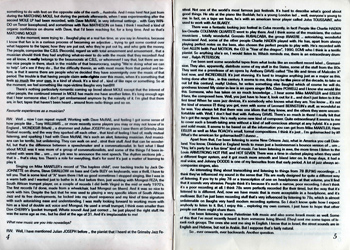
|
Favourite experiences as a musician?
RW: Well … now I can repeat myself. Working with Dave McRAE, and feeling I got some sense of how people like - Tony WILLIAMS … or more recently some players you may or may not know of in England … MONDESIR (Mark) … a drummer and Julian JOSEPH on piano; I saw them at Grimsby Jazz Festival recently, and the way they sparked off each other … that kind of feeling I had of, really mutual listening, and sparking I had with Dave McRAE. He's such an alert, listening musician. And musicians can be terrific, but unlistening. They can walk on and … strut their stuff. And that can be wonderful, but that's the difference between a speechmaker and a conversationalist. In fact what I liked about MOLE was it was more of a group of conversationalists, and some of the things I’d been involved with were like … um … our job was to announce the next speech. The rhythm sections job … that is … that's okay, too. There's a role for everything, that's for sur! It's just a matter of learning to play it.
Singing on Mike MANTLER's record of "The hapless child", over backing tracks by Jack DeJOHNETTE on drums, Steve SWALLOW on bass and Carla BLET on keyboards, was a thrill, I have to tell you. That is some kind of "A" team there I felt so good sometimes I stopped singing, like I was in a warm bath and I wanted just to bathe in it. And before then, just working with Mongezi FEZA, the South African trumpet player, on a couple of records I did (with Virgin) in the mid of early 1970's. The first records I'd done, mado from a wheelchair, had Mongezi on (them). And it was so nice to work with him. Despite the fact that he was used to playing a very specific idiom of South African Jazz and its free developments, he locked into my chord sequence and my kind of time signature with such astonishing ease and understanding. I was really looking forward to working more with him as a kind of double act: voice and Mongezi. He used a small trumpet I think even smaller than Don CHERRY’s (pocket trumpet). Whata sound! And just correct … he just played the right stuff. He was the same age as me … but he died at the age of 31. And it's irreplaceable to me!
What new music are you into nowadays?
RW: Well, I have mentioned Julian JOSEPH before … the pianist that I heard at the Grimsby Jazz Festival. Not one of the world's most famous jazz festivals. It's hard to describe what's good about good things. He sits at the piano like Buddah; he's a young London lad … well, everyone's young to me. In fact on a tape we have, he's with an american tenor player called John TOUSSAINT, who used to work with Art BLAKEY.
There was a fantastic looking jazz festival in Cuba recently, in fact! People like Charlie HADEN (ex-Omette COLEMAN QUARTET) went to play there. And I think some of the musicians, the cuban musicians … totally wonderful. Gonzalo RUBALCABA, the group IRAKERE … astonishing, wonderful musicians! And, some of the other people Charlie HADEN played with. He has, apart from always playing perfect notes on the bass, also chosen the perfect people to play with. He's recorded with Geri ALLEN (with Paul MOTION, the CD is "Year of the dragon". 1990, ECM) who I think is a terrific pianist. So anything she's on, I would listen to. Which reminds me, there is an extraordinary drummer … Ralph PETERSON.
I've been sent some wonderful tapes from what looks like an excellent record label … Gramavision. They also, apparently, distribute some of my stuff in the States, some of the stuff from the 80s. They sent me a prerelease of an opera by Anthony DAVIS called "The life and times of Malcolm X" (out now. and INCREDIBLE!). It's just stunning. It's hard to imagine anything just as a major as this, being done after this in this … century. It seems to me, this may be the piece of the decade, to take us out (of this century), really! Unless, he writes something else (laughs) which of course he will do, goodness knows! My sister-in-law is an opera singer (Ms. Claire POWELL) and I know she would like this. Someone, who has taken on so much knowledge … I hear some Mike MANTLER and EISLER (Hans, the composer) here. Well, you just have to hear it look out for it … and don't just listen to it the first time! When he uses jazz devices, it's somebody who knows what they are. You know … it's not Ihe kind of ersance (?) thing you get, even with some of Leonard BERNSTEIN'S stuff, as wondeful as he was. You always felt that there was one idiom that they knew, and the others they were uncomfortabble with. Well, I don't feel that with Anthony DAVIS. There's so much in there! I really felt that he’s got the range there. He's really some new kind of composer. Quite extraordinary! It seems to me to cover such a breath-taking area without a kind of self-conscious attempt at any hybrid. It's a pure and solid music. It seems to be based on all the information you can get from Mike MANTLER, Hans EISLER as well as Max ROACH'S small, formal compositions. I think it's just … I'm gobsmacked by it!! What's the american for gobsmacked?! I dunno…
Apart from that,I’ve been listening to some New Orleans Jazz, what in America you call Dixieland. You know, Dixieland in England tends to mean just a businessman's bounce version of … um … "Hey, let's party for a fun time" kind of music. I've been listening in awe, the more times I listen to the Louis ARMSTRONG HOT FIVE and HOT SEVEN. There was a time in clarinet playing when they used a different finger system, and it got much more smooth and bland later on. In those days, it had a real voice, and Johnny DODDS is one of my favourites from that early period. A lot of jazz always accompanies singers, also.
An interesting thing about transcribing and listening to things from 78 (R.P.M.) recordings … I think they've influenced my sound in the sense that 78s are really designed for quite a different way of listening. If you try to play 78 or a transcription of one on headphones at that volume, you'll find that it sounds very abrasive. People think it's because it's such a narrow, poor recording. I don't think it's a poor recording at all. I think 78s were perfectly recorded (for their time), but the way that it's listened to is different. And, now we have music that is more acceptable in a headphone, and it's mellower. But I've just been recording stuff that's very influenced by listening to 78s, which is almost unlistenable on (laughs very hard) modern recording systems. So I don't know quite how I expect anybody to listen to it. But I enjoy this … exploring my own comers. I just have to hope that other people out there might share them.
I've been listening to some Palestinian folk music and also some Israeli music as well. Some of this that I've most recently heard is from someone living (there). (They) sent me some tapes of Israeli rock groups. The ones she sent me sing in English. I know that in Israel, the street sounds are in English and Hebrew, but not in Arabic. But I suppose that's fairly natural.
So … ever onwards, ever backwards. Another question.
Life and what do you dig about it…
RW: dig!? That’s an american expression. Well … the thing about life is, I don't know anything else, yet. I haven't got anything to compare it to. And so it's a kind of one horse race. I'm not sure that it's … worth it yet … not mine. I have yet to find out (laughs)! I think it's odd, really. You know (if you) saw a man walking down the street … with a large pair of antlers on his head, and a glass bowl in his hand, saying _ "I've got to get to Wisconsin in 10 minutes" - You'd think, "What a strange man! What a strange thing to say. And why is he saying it here? And why is he telling me?!" Well I think life's a bit like that to me. I just think, "What on earth set this thing off?" I can't think of the motivation. I've read various religious texts on the subject and they all seem to be totally all kitsch on the subject. Just the kind of things people would say, just … Self serving romanticism. I find some of the oldest religions more intelligent that the latest ones. I think religions just become stupider as the centuries roll on! The most ancient ones, like worshipping the sun, the water, and the rocks seem to me to have a basis in understandable reality. But the later (recent) ones … just seem like intellectual suicide to me. Any ways … I've lost a few friends there! Hi … bye … (laughs). Oh well … who wants millions of friends. Just a few will do me fine.
Everything about life is biased because the people who talk about it are alive; we don't really get a rounded bunch of opinions on this subject since everybody who talks about it are in the alive camp! Ummm … I haven't got any comparative (laughs); I can't remember being anything else. I suppose I should try and think about what life is. I mean, that interests me, as opposed to something else. I look … at the things that are nearly alive; having some of the characteristics in common with life, but yet not lifelike. For example, crystal formations. The only thing I can really identify … I mean crystal formations has in common with life … it's own charcteristics of wanting to reproduce itself … hummmn… reconstitute it's immediate environment, to rearrange its chemicals. It's difficult to see where that process becomes a desperate desire to celebrate oneself that charcaterizes the living object … I think it's extremely odd. I mean, if there wasn't any life … I wouldn't have predicted it. It seems to me extremely unlikely. I can imagine planets and chemicals and dust and wind and explosions. There are curious sorts of reversed parodies of life, like fire, which soom to travel … and want to take things on, consume things. Wether life is some last echo of what was once … a different kind of fire. I don't know.
There are specific things that I find unsatisfactory about what is called advanced life. It's the terrible trick that is part of our equipment … we're sent in (as) feeling human beings, which means we can surfer. (Laughs) My god, lots of living things just do that (laughs). Of course, I’m not a Puritan or a killjoy in any sense … I'm glad at every amount of happiness there is!! I'm very happy, instantly, for example, for conservatives. Because you know they've made it clear they don't need me! And that's a responsibility off my back! I didn't want it anyway; you know … that's great! So go ahead, you conservatives, and don't bother me, and I won't bother you (laughs hard)! But … don't bother me, and then I won't bother you. Life? Humm … I don't know yet. It all seems, faintly daft to me, to be honest.
|
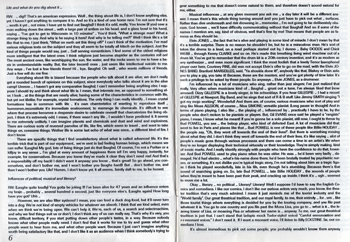
|
Influences of political, musical and literary?
RW: (Laughs quite loudly) You gotta be joking!!! I've been alive for 47 years and an influence enters my brain … probably … several hundred a second, just like everyone else's. (Laughs again) How long have you got? Uhh …
However, we are also filter systems! I mean, you can feed a duck dog-food, but it'll never turn into a dog. We're not kind of empty vehicles for whatever we absorb. I think that we kind select, even when we think we're being open. We can't help it. We're, each of us, a search and selectmachine, and why we find things suit us or don't, I don't think any of us can really say. That's why it's very, you know, difficult territory, if you start putting down other people's tastes, in a way. Because nobody knows what other people really need. I don't find that it works for me to try and guess what other people want to hear from me, and what other people want. Because I just can't imagine anything worth being satisfactory like that, and I don't like it as an audience when I think somebody's trying to gear something to me that doesn't come natural to them, and therefore doesn't sound natural for me, either.
Musical influences … at any given moment you ask me … a day later it will be a different answer. I mean there's this whole thing turning around and you just have to pick out what … surfaces. Rather than dive underneath and risk drowning in … memories … I'm not going to be deliberately obscure; God knows … we'll have difficulty communicating without that (laughs)! And so if some of the names I mention are, say, kind of obvious, well that's fine by me! That means that people are as famous as they should be.
Elvin JONES … the fact that he's alive and playing is some kind of miracle. I don't mean by that it s a terrible surprise. There is no reason he shouldn't be, but he is a miraculous man. He's sort of taken the drums to a level, on a road perhaps started out by, I dunno … Baby DODDS and Chick WEBB … through Kenny CLARKE and so on. He's made this breathing living wind machine out of a drum kit. You've got to remember that the drum kit is a 20th century invention, and it's as modern as any synthesizer … and even more significant. I think the most foolish that a lovely Tenor (saxophone) player over here, Courtney PINE, did was not accept Elvin’s offer to go on the road, with the Elvin JONES BAND. Branford MARSEILLES, said, "Ya shoulda done it", anybody like that Blakey or Elvin asks you to play a gig, you take it! Because, these are the masters, and you've got plenty of time later. It's such a privilege to be asked by these people. So anyways … Elvin JONES, as a drummer.
I'm influenced by a lot of musicians who sing, rather than jazz singers; I've just realized that really. Very often when musicians kind of … (laughs) … grunt out a tune, I've always liked that (now amused). Dizzy GILLESPIE is a lovely singer, in his schooldays. If you hear GILLESPIE … I had a record of GILLESPIE at Newport, Big Band, and he sings that sort of R & B stuff. Like Jimmy SMITH singing "I got my mojo working". Wonderful! And there are, of course, various musicians who sort of play and sing like Mose ALLSION, of course … Nina SIMONE; versatile pianist. (Long pause in thought) And in terms of piano playing, I also like … the playing of … influenced by … practically I have to be, by the people who don't reckon to be pianists or players. But, Gil EVANS once said he played a "rangists" piano, I mean, I know what he meant! If you're gonna be a solo pianist still now, I ought to throw by Bud POWELL, you see … the bebop player, who kind of defected East A lot of musicians did that went to live in Paris and places like that … Bud POWELL is one of these people like Billie HOLIDAY … the people say, "Oh, they went off towards the end of their lives!". But there is something moving about what they did. I don't think they went off towards the end of their lives, it's like saying … alot of people's music goes through various processes and there can come a time in an artist's life when they're no longer displaying their technical virtuosity or their knowledge. They're simply making, kind of iconic marks. And I really identify strongly with people who have the confidence to do that, however. And Bud POWELL used to play piano when he was older. He was … he'd been very badly … damaged. He'd had electro … what’s-his-name done there; he'd been brutally treated by psychiatric nurses, or something. It's not dislike you're typical tragic story, I'm not talking about him as a tragic figure: I think he played wonderfully, late in his life, even though he's stumbling. Because there's that sound of searching going on. So, late Bud POWELL … late Billie HOLIDAY … the sounds of people when they're meant to have been past their peak, and cracking up inside. I think it's … ugh … seemed to move me a lot.
Okay … literary … no political … Literary? Literary! Well I suppose I'd have to say the English Comics and comedians. I like our comics. I don't like our serious actors very much, you know, the theater tradition that's very much admired. I mean it just reminds me of the tourist industry and the "World family". Our great theatrical tradition, and our royal family, to me, their entirely … for … um … like those tourist things where everything is decided for you by the touring company, and you file past whatever it is. You go to one country and you file past the Mona Lisa, you go to … what is it … the leaning tower of Lisa, or moaning Pisa or whatever her name is … anyway. To me, our great theatrical tradition is just that, I can't stand that (adapts mock Tudor-styled voice) "Careful ennunciation and r-r-resonant voices." I don't need it. If I want a resonant voice, I’ll listen to Billy ECKSTINE. So, our comedians I love.
It's almost immedious to pick out some people; you probably wouldn't know them anyway.
I'm not sure they’d translate. They very often came from that musical circuit that used to be in England towards the end of the last century. I suppose, the thing that in America developed into a Vaudeville thing. And related to that there was a kind of … sort of … I suppose … 19th century, turn-of-the-century English funny writers and children's writers. People like Edward LEAR … I really like. I mean, in the same way, America, I really like James THURBER. I mean where do I stop?! That just comes out the Rotten Hat at that particular moment thinking about that question.
Political influences? This is a kind of overwhelming question. It s almost like the same answer, in a way, to the musical ones. You gravitate to what seems to capture your imagination. I'm not even sure you chose to. (Matter-of-factly) England is run by a very conservative establishment, which as Christopher HITCHINGS has pointed out, there's an attempt to sort of copy it in the United States, almost a kind of reaction of aristocracy of leadership. In both cases anyway, you'd have to say they were aligarties (ein Schreibfehler?, ich nehme an, gemeint ist Oligarchie: Herrschaft einer kleinen Gruppe, ursprünglich der Reichen, über das Volk) rather than democracies. Well, obviously if you had to spend any money at all, to become a candidate, that disqualifies most of the people who should do it (laughs). Let's think …
Communism and Socialism as your influence … well, I sort of realized I was one by accusation. I mean, in the sense that … in South Africa, the description of the laws to prevent the move towards democracy, and away from fascist dictatorship, were called "the Laws Against Communism". I've simply just allowed to be named by my enemies. I mean, when you say all the things I say, or think the things I think, you get called a communist. So I figure, well … if it's useful for people to have a way of identifying me, then I'll live with that because … ummm … "You must be a Commie! Oh, alright if YOU say so!" All these names are labels; they've got nothing to do with what we are as a kind of living, breathing bits of … ecoplasm, or something. Names are just attempts at identifying this one particular lump of ectoplasm from another, by the group at large. And so it just sort of became aparent that I was one, because people like me get called one and I'm not gonna argue with … conservatives. If they say that people like me must be Communists … They're very well educated, they are the standard bearers of civilization … they should know!! I'm certainly neither of those things, so I must accept their word for it. I'm a Communist because I just found that the kind of things I think, I'm told, are communistic. Okay. People say, "Well why in America do you have these other words like Liberal?" Well, that's one of these words that doesn't mean the same in England as it does in America. Because we have political parties, for example, a sort of Liberal (Labour) and Conservative party. In England, the Liberals, if they are here, are sort of like twins with the conservatives in a sense that … like if you're being questioned by a policeman and one's the heavy one who might push you around, the other one says, "Never mind him. Look, I'm your friend. Have a cup of tea. Look let's talk about this." Police work in pairs and so do political parties with their people. And in England, the Liberals and Conservatives are just kind of … "Nice guy / Tough guy". But they're both defending and protecting and talking in behalf of the same interests. So I have to avoid use of the word Liberal. It also suggests a certain kind of moderation, and I have no understanding or conception of what possible use political moderation could have. I can't imagine the kind of moderate, balanced response to any particular situation. Like, for example, the right wing extremist says, "Kill 6 million jews"; the left wing extremist says, "Don't kill any jews". So I suppose the moderate, "Well, maybe we should kill about 3 million … then everybody'd be very happy." (Laughs hard) I don't understand the moderate position, you know what I mean?
Soweit das Interview, daß Terry R. VALDERAS vom old rottonhats Journal per Cassettenzusen-dung mit Robert WYATT hielt Als Ergänzung zu den schon recht ausführlichen Antworten von Robert WYATT folgen jetzt noch einige Fragen, die Phillippe RENAUD von IMPROJAZZ an Robert WYATT stellte und die teilweise Bezug auf das Vorhergegangene nehmen.
Phillipe RENAUD: It seems to us that your music has always mixed 'beauty' with "messages" (political + social), by using the vehicle of music to communicate a point of view in a more sophisticated way than, for example, the popular agit-prop songs of Cornelius CARDEW. Are you doing, in a certain way folk music ?
Robert WYATT:
Do I make folk music ? Of a type? If only by default, yes, in that my methods
cannot have the authority of conservatory discipline, nor are they geared to an analysis of markets, in other words, my music is neither classical nor pop. What else is there? If 'Blues' is Folk, and flamenco - me too, please. As for the relationship between 'beauty' and 'message', well the poet Laura JACKSON abandoned poetry when she came to the conclusion that the pursuit of beauty and the pursuit of truth were irreconcilable disciplines (who has the key to an escape route from this dilemma? the humourist).
It occurs to me, translation can never be exact because, for example, if I talk about 'meaning' - well, the dictionary says 'vouloir dire' - 'to mean'. I like that – 'to want to say' - it is a compassionate compound but in English 'what something wants to say' is not inherently 'what it means (take for example words like 'Apartheid' or 'Swastika'.)
Another french term I like is your words for 'that doesn't matter - 'Ca ne fait rien'. It describes better my 'meaning', my 'purpose'. Not 'that doesn't matter' (everything 'matters') but precisely: 'it doesn't do anything'. My lyrics are for the comfort of sympathetic souls. I am not a recruiting sergeant for 'the cause'. I simply define my position, like any other artist.
Do you think that the social and political point of view of your music is changing? (for instance, the propaganda from “Gloria Gloom” / “Stalin wasn't stallin” towards the political songs from "Old rottenhat" or "Dondestan"?) Going further, how this can conciliate with the pure and tough line that you love, facing CASTRO's Cuba?
RW: True to the avant-garde tradition (you like that? 'avant-garde tradition?') I search for beauty where others see only ugliness. So, true to this tradition, I am a reactionary: I react against the assumptions of the liberal / conservative establishment (Irresponsible? No. Ca ne fait rien.)
Why am I doing this? To balance myself. For example, the conservative / liberal elites are determined to humiliate and destroy any one who challenges the master / servant relationship between … oh … the North and the South. This makes my heart feel ill: and I say so, "Ca ne fait rien". It does nothing. So don't let it worry you!
But is your social and political position changing ?
RW: I cannot recall any song I've written, of those revealing a Marxist / Leninist influence, which no longer reflects my inclinations. The camouflaged racism of international capitalism still revolts me. I never try to be subtle about this! On the contrary, I try to eliminate the evasive camouflage of decorative art. Autopsy will reveal the words 'dirty communist' engraved on my spine. Of course, my spine has an interesting break. I am a broken machine, a nice metapher for those who like a little symbolism with their soup.
The most widely accepted form of 'engaged art' is the prayer. (Others? the hymn, the national anthem, and the ritual song / dance for rugby / football teams.) The christian prayer, before eating, thanks god for his bounty. Native american 'Indians', by contrast, would thank the buffalo. Would offer a prayer to the spirit of the buffalo. Of course, I prefer the Native American art.
By extension, while Zionists thank god for Israel, I would be rather more impressed if they thanked the native Palestinians. If colonialism is to continue to be the basis of our civilisations, we could at least say thank you to the appropriate victims, otherwise words like 'repentance' are just verbiage - yes camouflage again. When it comes to agit / prop, some of us can compete with the hardline extremism of the religious establishments. They are tho masters of the genre.
Looking at your actual work, do you think about a normal evolution, non-criticable, or do you have other feelings, looking back ?
RW: Aha ! A question about my actual work Safer ground? No, however, I do not feel it followed a normal evolution, non criticable. I feel crippled not by paraplegia, but by my own terminally frustrating inadequacies and limitations, I sell my songs because I need the money, otherwise I would not have the nerve. It is not a luxurious question of evolution, it is a more basic problem I still have, I don't even know how to begin. I remain, naturally gratefully surprised by people who listen to the results. What can I say ? Thanks.
Gary WINDO is dead in July 1992, Ollie HALSALL in April 1993, Mongezi FEZA, Chris McGREGOR, Dudu PUKWANA … all people, you have known. What are your feelings about all these dead friends?
RW: What are my feelings about all my dead friends? It's true, my most sympathetic musical companions have already achieved perfect peace, I envy them but feel a bit lost without their warmth. Many of our luckiest moments together are not yet publicly available, but exist on a few tapes still. These tapes are my friendly ghosts. Tapes with Gary WINDO and Mongezi FEZA in their group SYMBIOSIS, tapes of Gary WINDO with me and Dave McRAE, the wonderful pianist etc. Incidentally, there are other happy moments on private tapes with musicians, like Dave McRAE, are still, as I speak, very much alive.
For example, I did some 'duets* with the brilliant keyboard player Francis MONKMAN. And perhaps my proudest moment when saxophonist Evan PARKER contributes a solo to complete a song written with Paul HAINES, 'Curtsy. (Some good memories after all).
|

